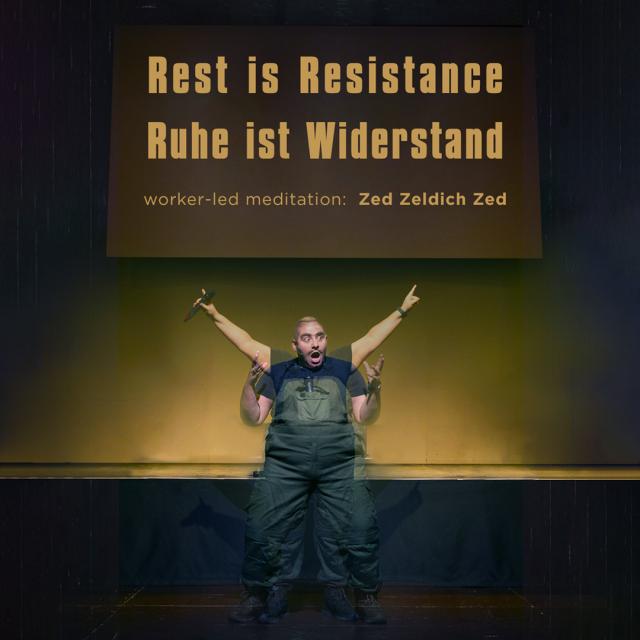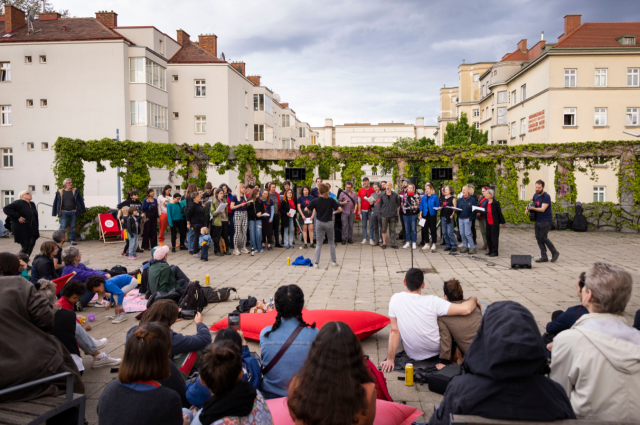Rest is Resistance
Who has the right to rest?
Wer hat das Recht, sich auszuruhen?
Ko ima pravo na odmor? Kimin dinlenmeye hakkı var?
¿Quién tiene derecho a descansar?
من له الحق في
الراحة؟ چه کسی حق استراحت کردن دارد؟
What comes to mind today when we talk about resting? Do we even believe we have the right to be lazy? The context of modern life requires a constant existential struggle and an effort to satisfy basic needs, taking away the right to rest.
The idea to deal with the topic of rest and the loss of the right to rest started while I was still in Serbia, because it was more connected with the loss of a system where rest was institutionalized and where the entire society had the opportunity to rest, both workers and companies. I remember that, through my dad's company, we could go to some union resorts on the sea and people seemed much more relaxed then, compared to now. We even had a more functional railway, it was called the Jadran Express, and so an integral part of that vacation meant that you got on the train, bought a very cheap ticket, and went to the resort - where, I remember, food was also included. And then came poverty, war, transition, and the temptation of capitalism in its worst form.
When I moved to Vienna, it was clear to me that I was entering an already cemented capitalism, where you have to earn the right to vacation, and it is a matter of privilege. The question arises: who has the right to rest? During the three years of my life, work, and creation in Vienna, I have encountered injustice and migrant exploitation in various fields. By exploiting people who still do not know the German language, they are given the most difficult jobs.
Then there was that rebellion: wait a minute, in the 1960s, people from Yugoslavia came to Austria as a result of the signed cooperation agreement, built most of the places where those Austrians live, sit, and the roads they drive on. From an artistic standpoint, the question of laziness resonates with me as an eternally undesirable human phenomenon. And yet we know that the best creations are created when we let our bodies and our brains be just that—lazy. Then that sincere creation appears. A sincere desire to realize our imagination, stemming from our deep peace or restlessness.
Since in this issue of migrazine magazine, we are talking about Life, Joy, and Resistance, one of the important things is to bring back laziness as a process of enjoyment, and as a process of resistance. We live in a bureaucratic and administrative system, where people become just numbers, statistics, and consumers of goods that have a shelf life; as long as we can be productive, then we are good. That capitalist mantra has led us to believe that rest or stopping work means the end of the world for us. I see in art how important it is to constantly and constantly produce, and everyone is in some form of burnout, and can no longer cope with the demands of the system that forced us to believe that we are only valuable and valued if we produce something.
It's a trap, it's a trap!!!
The loss of the opportunity to rest has led to numerous health issues and
Rest is a class issue!
Rest is a strike!
The right to rest and stop, to be present, to hear ourselves, to see ourselves is resistance to capitalism.
Each of us finds her/his/their own way to resist the imperative of capitalism and constant production, through some of her/his/their own ways that mean rest for them. Some people like to plant plants and trees, hoe the garden. Some like to help animals, some like to spend time with their friends.
For me, rest is when I allow myself to turn off all devices for two hours during the day, not watch the news, be with my cats, cook food, and spend time with my friends. For me, rest is when I know that the people around me are good, and that they have the strength to push through this harsh and difficult, yet important and joyful life. We should celebrate the moment that we are here, that we are alive, celebrate each of our emotional ups and downs, each of our stops when we are good and when we are not good. It is important to return to forgotten socialist values. I know it sounds utopian, but if we already had that system, why did we forget it so easily?
Class struggle is the most important struggle for me, and the right to rest becomes a question that is a significant answer to capitalism because resistance, when we rest, is every capitalist's worst nightmare!





